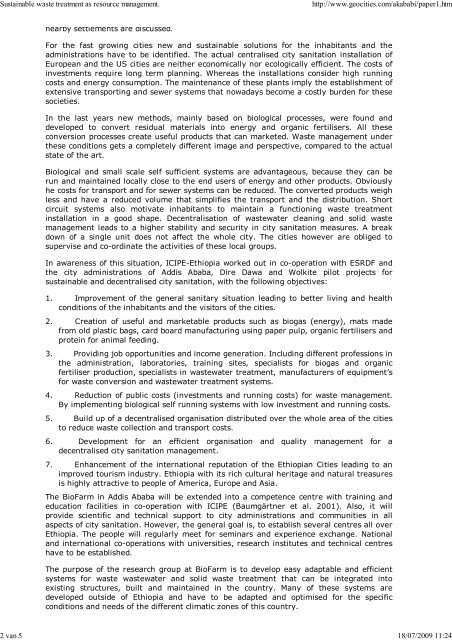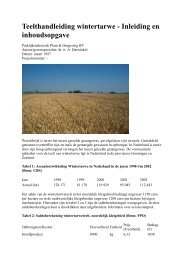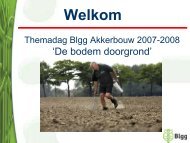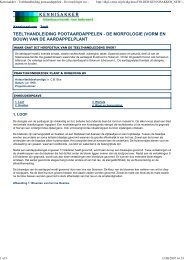Sustainable waste treatment - Conservation Agriculture
Sustainable waste treatment - Conservation Agriculture
Sustainable waste treatment - Conservation Agriculture
Create successful ePaper yourself
Turn your PDF publications into a flip-book with our unique Google optimized e-Paper software.
<strong>Sustainable</strong> <strong>waste</strong> <strong>treatment</strong> as resource management.http://www.geocities.com/akababi/paper1.htm2 van 5 18/07/2009 11:24nearby settlements are discussed.For the fast growing cities new and sustainable solutions for the inhabitants and theadministrations have to be identified. The actual centralised city sanitation installation ofEuropean and the US cities are neither economically nor ecologically efficient. The costs ofinvestments require long term planning. Whereas the installations consider high runningcosts and energy consumption. The maintenance of these plants imply the establishment ofextensive transporting and sewer systems that nowadays become a costly burden for thesesocieties.In the last years new methods, mainly based on biological processes, were found anddeveloped to convert residual materials into energy and organic fertilisers. All theseconversion processes create useful products that can marketed. Waste management underthese conditions gets a completely different image and perspective, compared to the actualstate of the art.Biological and small scale self sufficient systems are advantageous, because they can berun and maintained locally close to the end users of energy and other products. Obviouslyhe costs for transport and for sewer systems can be reduced. The converted products weighless and have a reduced volume that simplifies the transport and the distribution. Shortcircuit systems also motivate inhabitants to maintain a functioning <strong>waste</strong> <strong>treatment</strong>installation in a good shape. Decentralisation of <strong>waste</strong>water cleaning and solid <strong>waste</strong>management leads to a higher stability and security in city sanitation measures. A breakdown of a single unit does not affect the whole city. The cities however are obliged tosupervise and co-ordinate the activities of these local groups.In awareness of this situation, ICIPE-Ethiopia worked out in co-operation with ESRDF andthe city administrations of Addis Ababa, Dire Dawa and Wolkite pilot projects forsustainable and decentralised city sanitation, with the following objectives:1. Improvement of the general sanitary situation leading to better living and healthconditions of the inhabitants and the visitors of the cities.2. Creation of useful and marketable products such as biogas (energy), mats madefrom old plastic bags, card board manufacturing using paper pulp, organic fertilisers andprotein for animal feeding.3. Providing job opportunities and income generation. Including different professions inthe administration, laboratories, training sites, specialists for biogas and organicfertiliser production, specialists in <strong>waste</strong>water <strong>treatment</strong>, manufacturers of equipment’sfor <strong>waste</strong> conversion and <strong>waste</strong>water <strong>treatment</strong> systems.4. Reduction of public costs (investments and running costs) for <strong>waste</strong> management.By implementing biological self running systems with low investment and running costs.5. Build up of a decentralised organisation distributed over the whole area of the citiesto reduce <strong>waste</strong> collection and transport costs.6. Development for an efficient organisation and quality management for adecentralised city sanitation management.7. Enhancement of the international reputation of the Ethiopian Cities leading to animproved tourism industry. Ethiopia with its rich cultural heritage and natural treasuresis highly attractive to people of America, Europe and Asia.The BioFarm in Addis Ababa will be extended into a competence centre with training andeducation facilities in co-operation with ICIPE (Baumgärtner et al. 2001). Also, it willprovide scientific and technical support to city administrations and communities in allaspects of city sanitation. However, the general goal is, to establish several centres all overEthiopia. The people will regularly meet for seminars and experience exchange. Nationaland international co-operations with universities, research institutes and technical centreshave to be established.The purpose of the research group at BioFarm is to develop easy adaptable and efficientsystems for <strong>waste</strong> <strong>waste</strong>water and solid <strong>waste</strong> <strong>treatment</strong> that can be integrated intoexisting structures, built and maintained in the country. Many of these systems aredeveloped outside of Ethiopia and have to be adapted and optimised for the specificconditions and needs of the different climatic zones of this country.






